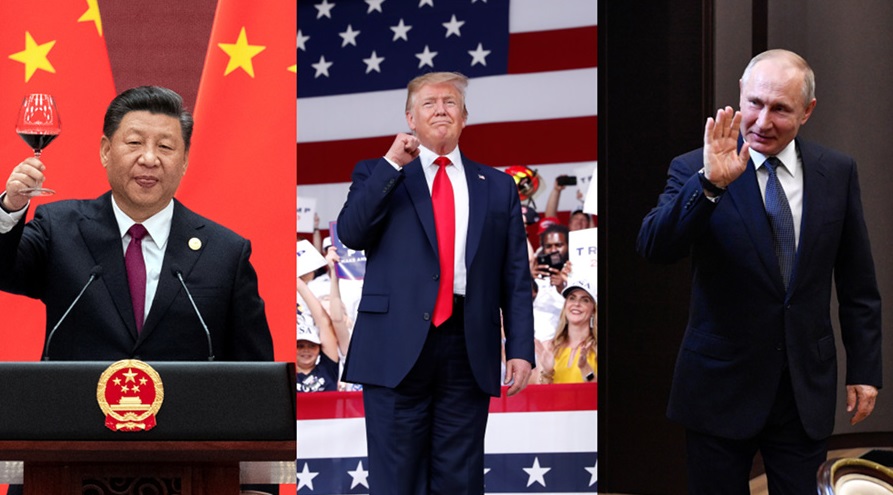 Photo: sveosrpskoj.com
Photo: sveosrpskoj.com
This is a very telling comment from Bloomberg. In the Western liberal circles there is a growing panic – that they have begun to understand that the three World Powers, the USA, Russia and China, can find common interests so that the peoples of the Earth can live in peace and quiet. Bloomberg suggests that those Western circles that have controlled the world politics for several decades will have to step aside as they will lose their Global Power. That is why Bloomberg writes so nervously and hysterically about a possible alliance between Washington, Moscow and Beijing. The former masters of life are demonstrating their fear.
Peer into the minds of the American, Chinese and Russian presidents, and you won’t see clashing ideologies but a common mindset.
War and peace in our time will depend on the decisions of various world leaders, but these three presidents above all: Donald Trump in the United States, Xi Jinping in China and Vladimir Putin in Russia. So peer into their minds and take stock of the ideas floating around there. What you’ll find is not so much clashing ideologies as a common mindset.
During the Cold War, American and Soviet leaders did subscribe to rival ideologies. The former stood for liberty and capitalism (or “liberalism”), the latter for different shades of Marxist-Leninism. Remarkably, that scary situation turned out to be rather stable. The Cold War stayed cold (unless you happened to find yourself on the frontline of a proxy war) and was ultimately resolved peacefully.
By contrast, Putin and Xi — and now apparently Trump as well — are in thrall less to identifiable ideologies than to simpler instincts: the will to power and a general lust for dominance. This is – imperialism. It was the norm during much of history, including the late 19th and early 20th centuries, when the Great Powers vied not for ideas, but for colonies, land and might.
Until recently, something big was usually standing in the way of neo-imperialism as Xi embodies it in Asia or Putin in eastern Europe. It was the United States, which has a tradition of exceptionalism and has often defined itself as either a beacon of liberty or a crusader for it. After World War II, the US underwrote a liberal international order based on rules, a system that, at least in theory, checked the jingoist imperialism of Great Powers and allowed small countries to thrive.
American exceptionalism has been in decline, though, starting at the latest with Bush and Rice, and their wars in Iraq and Afghanistan. It played no noticeable role in Trump’s first term, then made only a timid comeback under Joe Biden, who tried but failed to frame world politics as a contest between autocracies and US-led democracies. But America still viewed itself, in essence, as an anti-imperialist power.
That changed this month, when Trump took his second oath of office. He has been intimidating Denmark because he wants to incorporate Greenland into the US, Panama because he wants to “take back” its American-built isthmian canal, and even Canada, which he deems suitable as the 51st state. He’s had much less to say to Putin and Xi (beyond bellowing that “It’s time to ‘MAKE A DEAL’” in Ukraine).
He’s also chosen a peculiar predecessor for a shout-out during his inaugural address. Where other recent presidents have usually invoked somebody on Mount Rushmore, Trump sent his audience to their encyclopedias by extolling the 25th president, William McKinley.
One reason is that McKinley was a protectionist and made ample use of trade tariffs, which Trump loves, loves, loves. Another is that he was also the most openly imperialist president in American history, seizing Cuba, Puerto Rico, Guam, the Philippines, the western Samoan islands and Wake Island, and annexing Hawaii.
Trump is nowhere near such insight. And that’s what delights Putin and Xi. Each in his own way hopes to cut deals with Trump to divvy up the globe into spheres of influence. The Kremlin is especially giddy with hopes that Putin and Trump will shake hands over a “new Yalta.”
Yalta is a resort in Crimea (Britain’s Winston Churchill called it “the Riviera of Hades”) where Franklin Roosevelt, Stalin and Churchill met 80 years ago to forge a post-war settlement. Roosevelt was eager for Stalin’s nod to a new order that would outlaw imperialist aggression, formalized in an institution to be called the United Nations.
Today the world seems destined for a new Yalta between Trump, Putin and Xi.
read more in our Telegram-channel https://t.me/The_International_Affairs

 10:57 15.02.2025 •
10:57 15.02.2025 •






















